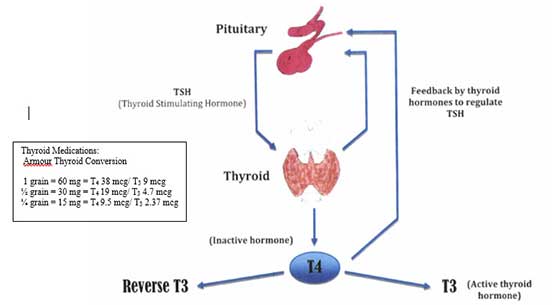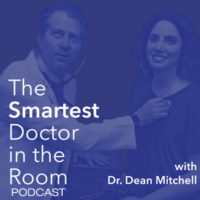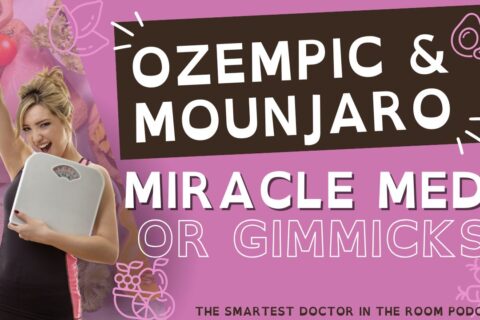Thyroid Optimization or Confusion?
Not Feeling Better on your Current Thyroid medicine? Maybe It’s Not the Right one?
I just saw 2 patients this past week with the same exact problem: both had been diagnosed with hypothyroidism, also known as underactive thyroid, and were taking Synthroid for several years to treat their underactive thyroid. Yet when I asked them how they felt they both used the medical term – lousy!
The first patient was a man who ate a healthy diet and was disciplined in exercising, but ever since he started taking Synthroid his energy levels dropped. The endocrinologist he went to for treatment continued to increase the Synthroid dose as his treatment plan and kept telling him your thyroid function tests look fine except they weren’t fine. They were in fact way off!
A woman I saw at my NYC practice was also put on thyroid medicine due to an autoimmune process called Hashimoto’s disease; this is where the thyroid makes auto-antibodies against itself and the thyroid function can decrease. She also was put on Synthroid and for 10 years she had gained weight, decreased energy and noticed her hair was falling out. Again, her endocrinologist (not the same one as the man) said your thyroid numbers look normal and there is no reason to change your dose or the medicine.
Rule #1 in Medicine: Don’t Treat Just the Labs – Treat the Patient!
These two cases were clear to me once I analyzed their lab results.
Both of these patients had low free thyroxine (or free T3). Even though they were taking Synthroid for their hypothyroidism their organs were not converting the Synthroid (which is T4) to the active hormone T3. Something that was not caught by either of their endocrinologists.
This is a problem especially for patients who have Hashimoto’s disease as well as other thyroid patients that may have low levels of the enzyme to convert the inactive T4 to the active T3. It’s like a runner approaching the finish line, but not crossing the finish line in a race.
By focusing on treating the entire patient and listening to their concerns as well as other health concerns they had such as decreased energy, weight gain, and hair loss, I was able to discover something that neither of their endocrinologists did in all their years of treatment.
Rule #2: It’s Okay to Question Your Doctor About Other Treatment Options
If you are not getting better on your current thyroid medication, whether it’s dose-related or not, you can question your doctor if there are other options.
These were the labs from the first patient:
TSH Free T4 Free T3
3.90 1.08 1.2

Rule #3: Don’t Just Look at TSH Levels
The biggest mistake of many doctors is that they just look at the TSH level.
Holistic thyroid experts realize that any level above 2.5 can indicate thyroid dysfunction. The labs list up to 4 as normal but many patients with symptoms are hypothyroid when their level is 3.
If we interpret the results carefully based on the symptoms it is apparent that the pituitary is secreting excessive TSH (thyroid stimulating hormone) to activate the thyroid gland but the thyroid is not responding.
The low free T3 is significant in this case because if he (the male patient) is just taking Synthroid (T4) his body is not getting adequate active thyroid hormone(T3).
So, what’s the solution?
This patient did very well once I prescribed for him a thyroid medication that contained T3.
Thyroid medications that contain both T4 and T3 are: Armour thyroid, WP thyroid, Naturethroid, and a pharmacy compounded thyroid.
Currently, Armour thyroid is the most widely available. WP thyroid and Naturethroid are back ordered indefinitely. Compounded thyroid medications can be custom tailored for the patient, but then you are dependent on a single pharmacy – so if you are traveling and run out of medication it may be a problem.
Rule #4: Thyroid Meds on an Empty Stomach
Thyroid medication must be taken on an empty stomach( no food or beverages other than water for an hour).
It is also important to take 200 micrograms of Selenium in either supplement form or one brazil nut daily which helps your body convert that T4 into T3.

At Mitchell Medical Group, we want to have you as an equal partner in the discussion to see which thyroid medicine is right for you so you feel great! We don’t believe in our patients feeling lousy as a result of their treatment protocol.
– Dr. Dean Mitchell M.D.
Mitchell Medical Group in NYC & Long Island
About the Author – Dr. Dean Mitchell, M.D.
Dr. Dean Mitchell M.D. is a Board-Certified Allergist and Immunologist based out of NYC. He graduated from the Sackler School of Medicine and completed training at the Robert Cooke Allergy Institute in New York City. He is also a Clinical Assistant Professor of Clinical Immunology at Touro College of Osteopathic Medicine, a fellow of the American Academy of Allergy, Asthma and Immunology, and the author of Allergy and Asthma Solution: The Ultimate Program for Reversing Your Symptoms One Drop at a Time. Dr. Dean Mitchell, M.D. has also been featured in The New York Times, The Huffington Post, Fitness Magazine, Dr. Oz and News NY 1. Dr. Mitchell also hosts the podcast The Smartest Doctor in the Room – a combination of a lively, personal and in-depth interview with top healthcare specialists.



